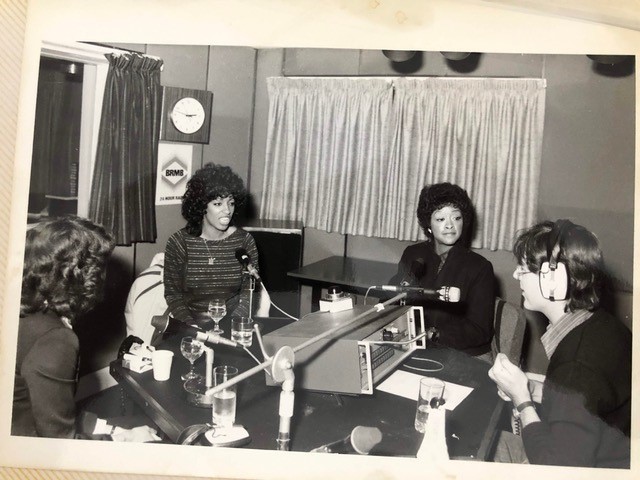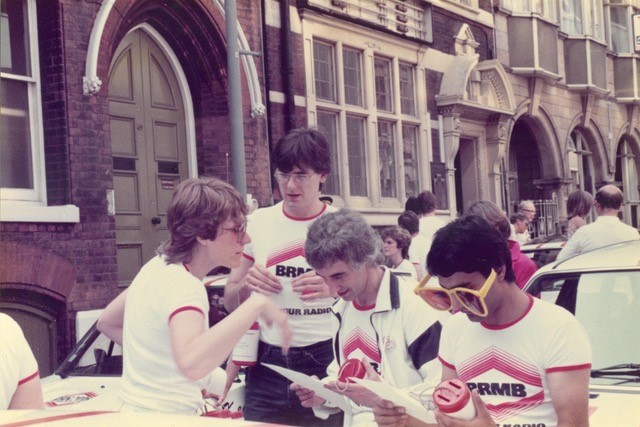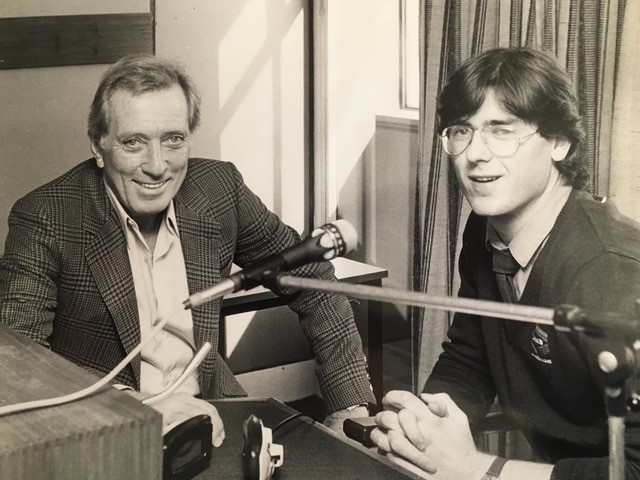In the 40 years he has been involved in the radio industry, there are few roles Phil Riley hasn’t performed. The adopted Brummie was on the verge of retirement when the Covid pandemic arrived – along with a business proposition. This man of the airwaves tells HENRY CARPENTER about his latest venture.
The long locks might have gone but Phil Riley still has it – that smooth, easy-going demeanour which seems to be the preserve of every radio presenter worth their salt.
He’s in his 60s now, but he has an energy and excitement of a man half his age. It even comes across loud and clear on a Zoom chat.
The reason for the glint in his eye is his new venture – Boom Radio – which 18 months down the line is exceeding all expectations.
And really, it came out of the blue just as he was easing into semi-retirement, possibly a little reluctantly, after a challenging executive role with media giant Bauer.
“It was when the first lockdown was imposed and I was starting to twiddle my thumbs,” he recalls.
“I thought my time in radio might have been and gone, but then the call came from David Lloyd who has been my closest work colleague for the last 25 years.
“He put the question to me – did I think that Radio 2’s intention to move to a younger audience opened the door for a new radio station specifically for 60 to 75 year olds, the so-called baby boomers, who had been locked in as listeners?
“I went away, crunched some numbers, and thought there’s something here, let’s work out how it might look.”
That exchange was in September 2020 – and they came to the conclusion that this was just too good an opportunity miss.
“The interesting thing to me is that David and I had done everything from presenting and programming to working with big business and private equity groups, but had never started a business from scratch,” says Riley.
“For two guys in their 60s that was quite daunting. Not only that, but we were going to be blowing hundreds of thousands of pounds of our own retirement fund.”
Raising capital was the first objective, and for that Riley reached out to friends and acquaintances “who might have a few quid stuffed down the back of the sofa”.
These individuals were carefully targeted, the stipulation being that they needed to be from the media industry “so they would fully understand and take a sensible view on what we were planning to do”.
The first round of investment raised £500,000 and this secured a DAB space in London and also gave the station an online presence. Boom Radio launched in February 2021 – on Valentine’s Day as it happens – and it was up and running.
Starting a new radio station at a time when commercial media – whether that be radio, broadcast or print – has been undergoing a colossal transformation could be euphemistically described as a bold move.
But the intrepid due were clear about the concept from the outset.
“We wanted to recreate the philosophy of the pirates, the early days of Radios 1 and 2, and the early days of commercial radio, specifically targeting the baby-boomer age group,” explains Riley.
“There are three pillars to Boom. The first is a broad range of music, not just the golden oldies. The second is a very deep music catalogue, playing anything from the Four Tops to the Beatles, but it’s not just the big hits. There’s a serendipity about an audience listening to a track they haven’t heard for 30 years.
“The third is a high personality index. We’ve got seven or eight presenters, all doing two-hour shows, which stands in stark contrast to other stations. Our listeners like the personality mix.”
So who are these personalities? Well, no one could accuse Boom’s founders of having to scrape the bottom of any personnel barrel – there’s some serious radio royalty on their schedule.
David “Diddy” Hamilton – whose career started in 1959 and is now in his mid 80s – is one of them. So is Pete Murray who is an almost unbelievable 97 years of age.
These are doyens of the industry so it says a lot for the gravitas of the Riley-Lloyd partnership and their proposition that they were able to secure these much-loved industry heavyweights.
“I am sure they probably thought that they had done their last radio gig before we picked up the phone to them,” reckons Riley.
“I suspect it also helped that with modern technology they could do all the work from home, whether in their back bedroom, in the garden shed or under the stairs.”
A firm philosophy was established and top-notch presenters hired . . . but has it worked?
“The response from day one has blown us away,” says Riley. “The level of response is one we had never seen before.
“We have got more than 440,000 listeners tuning in for an average of nine hours per week. These numbers might not seem particularly high but bear in mind that we’re starting from scratch. I think one million is a sensible medium-term prospect.
“But we realised early on that we made a mistake. Feedback quickly reached us that we only had DAB for London when it should be nationwide. That meant we had to re-approach our investors, which we did successfully and we got on a national digital multiplex. Since then we really haven’t looked back.”
The revenue is achieved through a variety of advertising streams, and the audience for market targeting has changed its behaviours radically over the last few decades. In Boom’s case, it is to the station’s advantage.
“The likes of my parents and those who were born in the war were traditionally very frugal, distrustful of brands and prudent with their money – and consequently not of any interest to advertisers,” he says.
“The baby boomers of today, our target audience, grew up in the 1960s with massive exposure to popular media and consumer-facing marketing.
“They are comfortable with brands, comfortable with spending money, and there’s a great deal of wealth in that generation.”
Riley and Lloyd are two industry veterans who clearly know what they are doing, and Riley’s entry on Wikipedia lists the galaxy of radio stations he has been involved with – usually in positions at high or highest of levels.
But to understand his passion for the industry fully we need to rewind the clock almost half a century to when Riley was a teenager.
He reckons there was only one career he wanted to tackle which came from a trio of interests.
Many a teenager has a passion for music, but his bordered on the obsessive. He would spend the money he earned doing a paper round on buying second-hand records in Manchester, the city in which he was born and bred. Then there was an interest in what he calls “electricky things” (he could build his own radio). Finally, he discovered he liked being on stage.
Of the latter, he says: “I got a role in the Christmas play at school as the narrator and I really enjoyed it. I thought that this was something I was quite good at.
“So the mixture of music, tech and performing pointed me in one direction – radio.”
His first steps inside a station were at Radio Manchester where he did a bit of work experience shadowing a lunchtime show presenter, but it was at university at Loughborough where his career really started.
“BRMB [now Free Radio] had a great training scheme and I was one of 750 applicants to succeed in getting on it,” he remembers.
This took Riley to his first role in Birmingham – and apart from the odd spell away, he was firmly based in the Midlands.
One of these spells came in the mid-1980s, when, in a bid to boost his business acumen, he decided to leave BRMB and embark on an MBA at Colombia University in the US. It turned out to be an inspired move and set him up as a more complete commercial radio package to add to his presenting, programming and general feel for the industry.
“I came back from Colombia just as the industry was starting to de-regulate,” he says.
“I took on the role of MD at a station in Leeds. It was this sort of position that my MBA had been designed for.
“It was actually very hard because there was a recession at the beginning of the 1990s – an awful time to be running a radio service, but I loved it and set up Magic 828, the original Magic station.
“A tap on the shoulder came four years later when I was invited back to Birmingham to launch Heart 100.7.
“I ended up in Birmingham and have never really left. Although I live in Leamington Spa now I still feel it’s part of the city.”
You malign Birmingham to Riley at your peril. This is a city and region he loves, and he admits to despising the way it has been portrayed over the years, particularly by the national media.
In his eyes, he is a Brummie – albeit an adopted one – through and through, and is enormously proud of the city and the region.
“It can hold its head up high and stand its ground in a way which perhaps it couldn’t before,” he says.
Nonetheless, when he was given the task of getting Heart off the ground, it was in the days of industrial unrest, economic deprivation and strained racial tensions in Birmingham.

“In hindsight it was a great job but I remember there was real concern that the station wasn’t going to work.
“It was felt by some that there simply wouldn’t be enough of a market for another commercial radio station.”
Riley’s employer was the media conglomerate Chrysalis, who he describes as “great creatively and with great musical knowledge but no real radio knowledge”.
He had to build the station from scratch and it was “a tremendously exciting time but it turned out ok”.
Riley was at Chrysalis for 13 years before the decision was made to sell the group to Global.
Eighteen months later, after a time-out period for Riley, he was back in the thick of acquisitive activity when a number of Midlands radio stations – namely BRMB, Mercia, Wyvern, Beacon and Gem 106 – came up for sale and his company, Orion Media, bought them. For reasons of confidentiality, he can’t and won’t disclose figures, but it’s been reported that the deal was done for £37.5 million.
“I thought I was lucky to get another crack – and we sold the stations to Bauer seven years later.” For £50 million, if reports are accurate, but again, this isn’t a figure he’s prepared to confirm.
It appears he has something of a Midas touch but he laughs this off – “there have been failures but they are buried very deep!”.
“I have been involved in an industry which has gone through a tremendous amount of change and growth,” he says. “I’ve been lucky enough to ride the crest of the wave.
“Stations have merged into networks and the industry has been massively transformed by the rise of digital – with DAB and smart speakers and so forth.
“You have to find a bunch of people you think your radio station will appeal to – that hasn’t changed.”
Which brings us back to Boom.
“I want Boom to be a case study in how to launch a radio station with the technology at your disposal.
“We feel we’ve hit a home run at the end of an innings. It feels magical and to do it so late in the day is extraordinary.”
And is this his last project?
“I promised my wife it would be!” comes the reply. “And to be honest, I also think it will be difficult to top.”
If Boom really is Riley’s last radio gig, his experience, track record, insight and energy all suggest it could be a resoundingly successful last hurrah.

Cash flow problems start to bite
Employers pledge support
Helping structure strategic direction

Our regional business leaders react to the news
Firm enjoys busy times despite Coronavirus lockdown
New face has extensive experience in commercial and residential real estate
Insurance risk and commercial law specialists reveal new roles
Business leaders' hopes for 2021
Trio of new hires bolsters commercial team
Facilities management firm doubles workforce
Hotel-style workplace in city centre
Head of office, Shakespeare Martineau
Law firm appoints commercial property expert
Property company keeps watchful eye on markets
Exhibition and conference brings connected industries together
Welsh firm brings its operations to Birmingham thanks to commercial property agents
Former home of world famous engineering firm has been sold
Recruitment agency posts sales increase